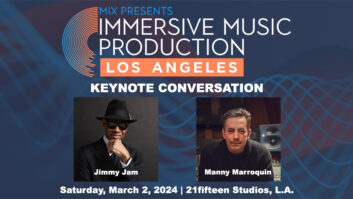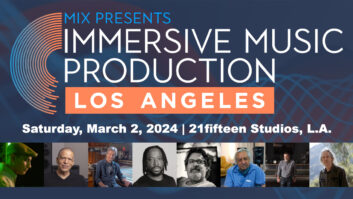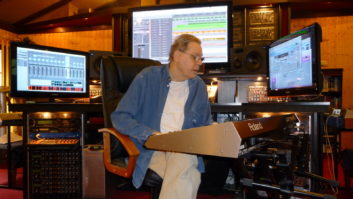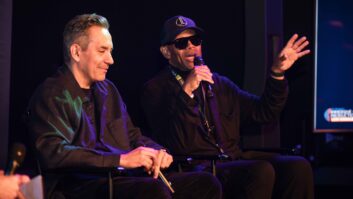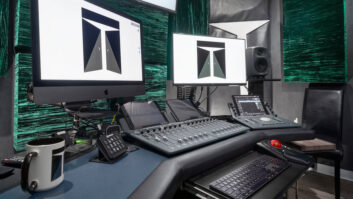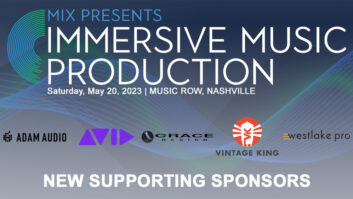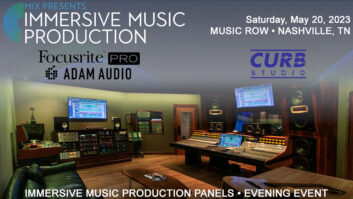Adam Hood is perhaps best known for writing songs for other artists such as Miranda Lambert, Lee Ann Womack or Brent Cobb, in addition to his almost non-stop live performances—which began when he was just 16 and still continue to this day. Hood’s new album, Somewhere In Between, sees him capturing his own songs in stripped-down production construct, enabling his natural storytelling abilities to truly come to life. Pro Sound News spoke to Hood about ‘recording live’ at Nashville’s Sound Emporium Studios.
On passing the torch
For me, it feels like such a rare occasion when somebody else wants to record my song, so I kind of lose my attachment to it, to be honest! In 2014, I put out a record with a song on it called “He Did”—a song I wrote for my father. I have a pretty significant attachment to that song, and other songs I’ve written for my kids. Usually, in a situation where it is an artist that comes and finds my material, there is a story about why they want to record it. So if someone comes to me and says, “Hey, I love this tune, and want to put it on my record,” it can mean a lot. It is kind of like passing the torch. The whole point is the relativity of the material, I guess, and that is what you hope for as a songwriter. So when artists come to me and say, “Man, you wrote this song and I can really relate to it,” it is a high compliment.
On working at Sound Emporium
I did a lot more writing and playing live before I ever went into the studio. The recording process is not effortless for me, but I feel like I get a little better at it and closer to the process each time. I knew the history of the Sound Emporium, and this time, we chose to record in room B. The vibe is all around when you walk through the front door, but once you get to that B room, things seem to get real organic. There is mojo in there and that studio really lives up to the reputation that it has. I’ve been to a few studios, but Sound Emporium is truly a comfortable environment to work in.
On keeping it raw
It was a conscious decision to try to make the record as live as possible. We recorded the entire album in two days, leaving one additional day for overdubs. Usually we don’t keep scratch vocals, especially me, but in this case, we kept a lot of the scratch vocals—and some of these performances ended up being the best takes of the pile. We felt that, and it didn’t really make sense to go back and do a whole lot of vocal overdubs. As far as guitar parts, I think I played maybe two. This was a conscious decision because I typically play [as a] three piece when we are on the road, just for the sake of efficiency. On this record, I ultimately wanted two things to happen: First, I wanted to make a record that I could reproduce as a three or four piece: Electric guitar, bass and drums. The other thing was that I wanted [guitarist] Pat McLaughlin in there. I don’t write all my good songs with Pat, but every song that Pat and I write is great and we have a cool relationship. I wanted him to play and sing with me and just build the band around that. We did it all live, and it was really fun and a cool process.
On working class roots
I began playing in front of people in church at 14, and got a little gig playing in front of people on the weekends at about 16. About six months into that, my parents bought me a PA system. So I had really supportive parents and a community of friends, family and people around me. Regardless of your background, you can second guess yourself a lot because it is such a competitive market. Now, in my view, the current industry has really leveled the playing field. The access to make and release a record is unbelievable easy, especially compared to how hard it used to be. Now, you have all the resources, you have affordable equipment and talented people at your disposal online—and it wasn’t always that way. As a budding artist, it took a while for me to get up the nerve to write, and then to play those songs in front of people. If I didn’t have constant encouragement around me, I would be doing something else for sure.
On over-producing
Every other record we’ve made has been in sixth gear. It’s been a five, or six-piece band and a full production in the studio, having an army of music behind you—and it is awesome. But I just cannot reproduce it live, and it ends up becoming a weight on your shoulders. We would go out and play a bunch of shows in Fort Worth or something, and one of the songs would come on the radio and I would listen to it and think, “We don’t do it like that,” and the struggle eventually became burdensome to me. Now, coming out of the gate with the guys on the new record, my first thought is “Wow, this sounds just like the record,” and that is such a good feeling. This time, I went into the project deliberately divorcing myself from that temptation of over-producing because I didn’t want to make that kind of record. Granted, on the next record, we might get strings and horns and make a Ray Charles record, I don’t know. But for this time, I wanted to get away from it.
Jacques Sonyieux is a devout explorer of recording studios and the artists that occasionally inhabit them. Please send any tips or feedback to Jacques at: [email protected].
